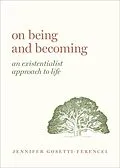While existentialism has long been associated with Parisian Left Bank philosophers sipping cocktails in smoke-filled cafés, or with a brooding, angst-filled outlook on life, Gosetti-Ferencei shows how vital and heterogeneous the movement really was. In this concise, accessible book, Gosetti-Ferencei offers a new vision of existentialism. As she lucidly demonstrates, existentialism is a rich and diverse philosophy that encourages meaningful engagement with the world around us, offering a host of fascinating concepts that pertain to life as we experience it. The movement was as heterogeneous as it is now misunderstood, influenced by jazz music, involving diverse thinkers from around the world, challenging received ideas about the meaning of human existence. Part of the difficulty in defining existentialism is that it was never a unified philosophy, but came to identify a set of shared concerns about the meaning and possibility of human freedom, as it may be expressed in authentic choices, actions, and projects. Existentialists all explored how, in the absence of traditional reassurances about the meaning of life, we may transcend our present circumstances, and give our situation new meaning. With existentialism, concrete, lived experience of the single individual emerged from the shadow of abstract systems and long-defended traditions, and became subject-matter in its own right for philosophical inquiry. Far from solipsistic, Gosetti-Ferencei shows that existentialist attention to the human self can be intertwined with ways of conceiving the world, our being with others, the earth, and the encompassing concept of being. Fully appreciating what existentialism has to offer requires recognizing the rich diversity of its prospects, which involve not only anxiety, absurdity, awareness of death and the loss of religious meaning, but also hope, the striving for happiness, and a sense of the transcendent. On Being and Becoming unpacks this philosophical movement's insights, and reveals how its core ideas promote creative responses to the question of life's meaning.
Autorentext
Jennifer Anna Gosetti-Ferencei is Professor and Kurrelmeyer Chair in German and Professor in Philosophy at the Johns Hopkins University. She is author of The Life of Imagination (Columbia University Press, 2018); Exotic Spaces in German Modernism (Oxford University Press, 2011); The Ecstatic Quotidian (Penn State University Press, 2007); Heidegger, Hölderlin, and the Subject of Poetic Language (Fordham University Press, 2004); and a book of poetry, After the Palace Burns (Zoo Press, 2003) which won The Paris Review Prize. She is the author of Imagination: A Very Short Introduction, forthcoming from Oxford University Press.
Inhalt
Part I: Encountering Existentialism Prologue Chapter 1:Existentialism in Style and Substance Part II: Existentialism: from Antiquity to Modern Europe Chapter 2. The Rise of Existentialism: A Philosophy for Human Existence Chapter 3. Historical Roots of Existentialism Chapter 4. Romantic Upheavals, Modern Movements Chapter 5. Literature and Art of Existentialism: the 20th Century Part III. Existentialism in Living Dimensions Chapter 6. Self Chapter 7. Others Chapter 8. World Chapter 9. Earth Chapter 10. Being Part IV. Living Existentialism 11. Existentialist Lives: Imitation, Inspiration, and Authenticity 12. Seeking and Taking (and Giving) Advice 13. Being in the Crowd: Anonymity and Individuality in Modern Life 14. Into One's Own, or on 'Finding' Oneself 15. I Selfie, Therefore I Am: On Self-Imaging Culture 16. Being and Waiting (Tables), or The Roles We Play 17. Seizing the Day: On the Present and Presence 18. Love in the Time of Existentialism 19. Existential Suffering, Happiness and Hope 20. Life as a Work of Art: an Existential Need for Creativity Bibliography
